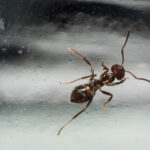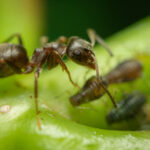How Can We Help?
Do ants bite or sting?
Ants can both bite and sting, but it varies a lot depending on the species. Many ants can bite using their strong mandibles, which they mainly use to grab and immobilize their prey or to defend themselves. When an ant bites, it usually injects formic acid into the wound, causing a burning sensation and irritation in humans. How bad it feels depends on your sensitivity and the ant species involved.

Other stinging ants, such as harvester ants and bullet ants, also deliver painful stings, with bullet ant stings being among the most painful insect stings in the world. While not all ants can sting, those that do can be a significant threat, especially in large numbers. Understanding the biting and stinging behavior of ants is crucial for effective pest control and personal safety, as well as for appreciating the diversity and adaptability of these insects.
Do ants cause illnesses?
Yes, ants can cause illnesses, even though they aren't usually as infamous as some other pests. They can act as mechanical vectors, which means they carry and spread pathogens on their bodies and in their digestive systems. While searching for food, ants often crawl through dirty areas like garbage, animal carcasses, and sewage. When they come into contact with food or surfaces in homes or businesses, they can transfer harmful bacteria like Salmonella, E. coli, and Shigella, leading to foodborne illnesses.
Certain ant species, like pharaoh ants, are especially troublesome in healthcare settings because they can spread pathogens that cause infections. These tiny ants can get into sterile environments, contaminating medical equipment and supplies. Additionally, carpenter ants can contribute to respiratory problems by increasing moisture levels in wooden structures, which promotes mold growth.

To minimise the risk of ant infestations and the associated health hazards, it's important to maintain good sanitation, seal entry points, and manage food storage effectively. Being aware and taking proactive measures are key to preventing the illnesses ants can cause. Hiring professionals like us here at Youngs Pest Control can also help you identify and eliminate ant colonies, reducing the risk of health problems. It's essential to address any infestations promptly and correctly to keep your home or business free from ants and the potential illnesses they can bring. So, it's crucial to stay vigilant and take necessary precautions to protect yourself from ant-inflicted illnesses.
